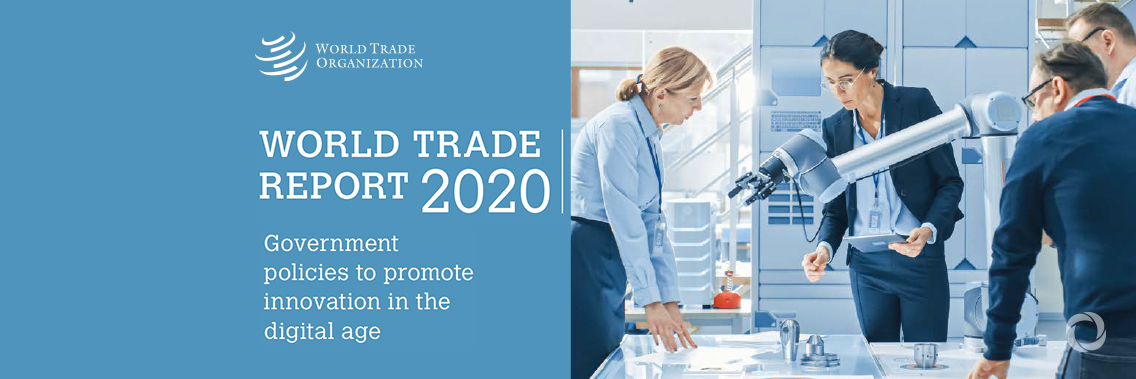World Trade Report 2020 explores increasing use of policies to foster digital innovation
A growing number of governments have adopted policies aimed at promoting innovation and technological progress for their economies, a trend which has implications for trade flows and the rules that govern global commerce, according to the 2020 edition of the WTO’s World Trade Report. The flagship publication maps out the use of government policies in the digital era and underlines the importance of countries working together to encourage positive global outcomes while minimizing negative spill-overs.
Historically, governments have often sought to use policy to enhance long-term economic growth and societal welfare,” Deputy Director-General Yi Xiaozhun said. “In the past decades, these policies have increasingly been outward-oriented, in recognition that openness and access to larger markets and increased competition lead companies to innovate. Thus, trade and trade policies have contributed to innovation.”
“In very recent years, spurring innovation in the digital field, whether new in the world or new in the country, is at the core of many new government policies, which have been adopted in countries at all levels of development,” DDG Yi said. “Just as the WTO fostered broadly open, predictable, and competitive markets in the wider global economy, it can in the future play an important role in reducing uncertainty in markets for digital goods and services. But this will require updating the WTO framework to address new challenges and demands.”
Since the 2008-09 financial crisis, some 115 countries have instituted “new industrial policies” and other industrial and digital development strategies aimed at advancing their economies towards digitally-enabled production processes and services, generally supporting the transition to the digital economy through technological upgrading and innovation. The report finds that some of the policy instruments being employed to this aim are relatively new. They include policies aimed at addressing access to data, research, and development support such as tax breaks to assist digital innovation, knowledge diffusion through the agglomeration of talents and skills, and technological hubs to maximize knowledge spill-overs.
The COVID-19 pandemic, furthermore, has accelerated the uptake of e-commerce and digital innovation and with it the introduction of government support measures for capacity building and upgrading in information and communication technology.
Developing countries are showing a clear interest in the transition to the digital economy. While the report notes some challenges, such as developing the necessary infrastructure, it also identifies opportunities related to the digitization of manufacturing production, inclusion in the new digital services supply chain (for instance in e-commerce and coding industries), and lower costs of reaching international markets through the Internet.
In the digital field, the WTO and its rulebook have proved to be forward-looking. The WTO has already supported innovation in many ways It has done so directly by eliminating tariffs on internet and telecommunications infrastructure products through the Information Technology Agreement (ITA), by liberalizing internet services through the telecommunications agreement, and by stimulating e-commerce with the moratorium on duties on cross-border digital flows, as well as by providing a robust and stable framework for the development of global and open standards, intellectual property protection and other critical rules based on the principles of non-discrimination, transparency, and reciprocity. Indirectly, it has supported innovation through the improved resource allocation and efficiency that result from open trade, which frees up resources to be devoted to new cutting-edge pursuits.
Moving forward, the WTO will continue to have an important role to play in reducing uncertainty in markets for digital goods and services. Members will have to consider how to encourage the sharing of benefits arising from innovation policies, what measures will be needed to facilitate investment, and whether new flexibilities can be expanded for governments to support domestic digital innovation. The mobility of skilled workers, data flows and privacy concerns, and anti-competitive behaviour in the digital industry will be of high concern as well, the report adds.
International cooperation to foster shared understandings about these policies would help forestall trade tensions — and thus lay a firmer foundation for innovation, investment, and cross-border activity to flourish.
Read the World Trade Report 2020: Government policies to promote innovation in the digital age.
Original source: WTO




